Beijing, (Reuters) – Chinese smartphone maker Xiaomi on Wednesday said it has received more than 100,000 orders for its first car – a sporty electric vehicle called the SU7 – as it began deliveries.
“Xiaomi’s car officially debuts, the real revolution in smart cars has officially begun, and China will surely give birth to a great company like Tesla,” CEO and founder Lei Jun said at a ceremony in Beijing marking the first deliveries.
The first deliveries come from a limited batch of 5,000 cars that Xiaomi had already produced – called the “Founder’s Edition,” equipped with additional accessories for early buyers.
Following last week’s launch of the SU7 – short for Speed Ultra 7 – Xiaomi advised buyers of its sedan that they could face wait times of four to seven months, a sign of robust demand.
Xiaomi’s shares surged as much as 16% on Tuesday as the SU7 drew strong interest, though a brokerage forecast the firm would lose nearly $10,000 per car this year. Its shares traded more than 3% lower Wednesday morning, against a 1.1% fall in the broader Hang Seng Index.
At Tuesday’s highest, the company had a valuation of $55 billion at a share price of HK$17.34 – higher than that of traditional U.S. automakers General Motors and Ford at $52 billion and $53 billion, respectively.
Xiaomi’s SU7 enters a crowded China EV market with an attention-grabbing price tag – under $30,000 for the base model, cheaper than Tesla’s Model 3 in China.
While the world’s largest auto market is challenging for newcomers due to a cut-throat EV price war and slowing demand, analysts have said Xiaomi has deeper pockets than most EV startups and its smartphone expertise gives it an edge in smart dashboards – a feature prized by Chinese consumers.
The company earns the majority of its $37.5 billion revenue from selling smartphones.
The SU7 launch fulfils the ambition of Lei, who announced the company’s foray into EVs in 2021, pledging to invest $10 billion in the auto business as “the last major entrepreneurship project” of his life.
Reporting by Sarah Wu; Editing by Christopher Cushing and Stephen Coates











